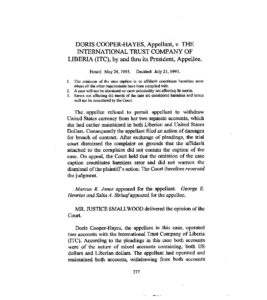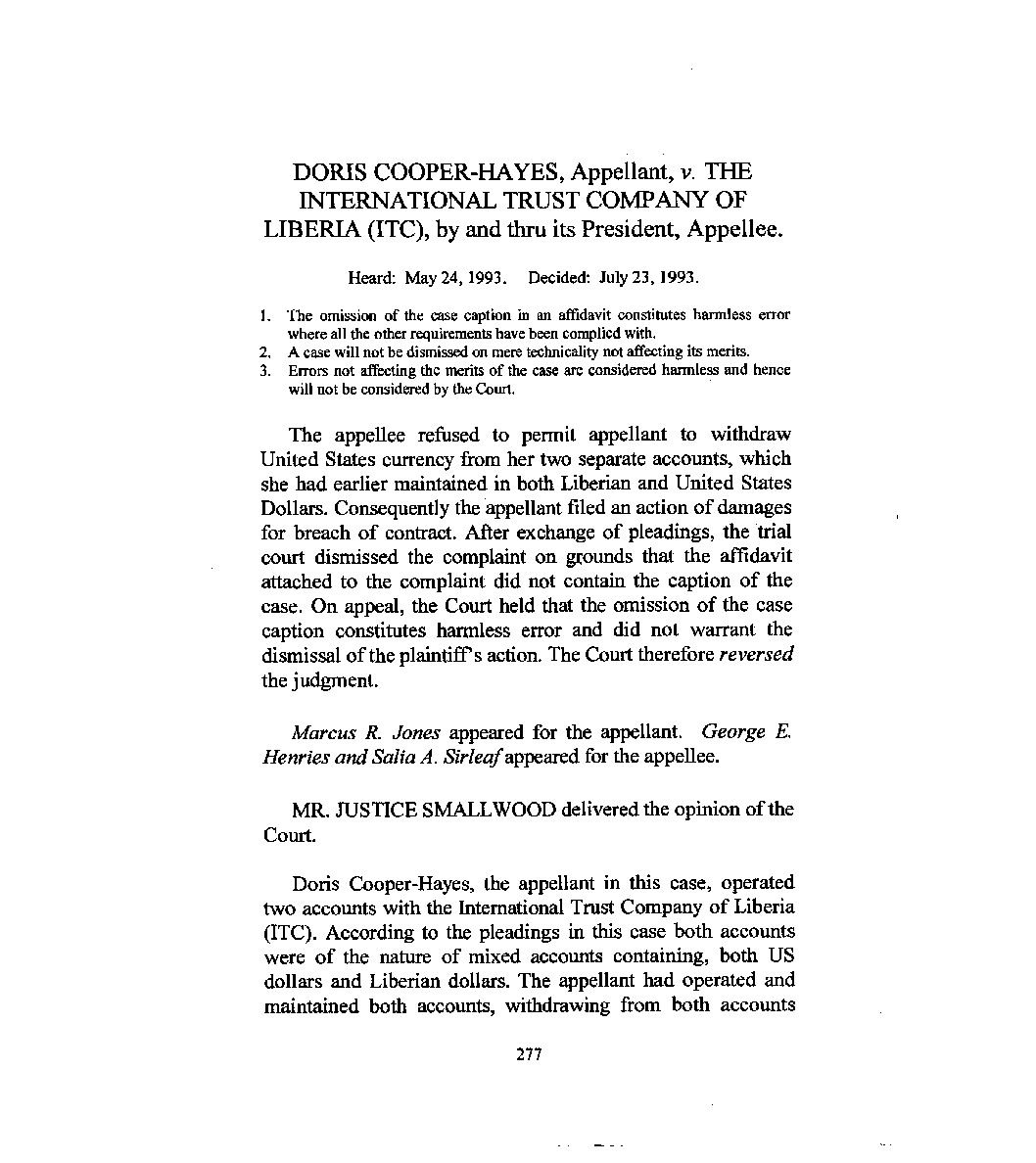DORIS COOPER-HAYES, Appellant, v. THE INTERNATIONAL TRUST COMPANY OF
LIBERIA (ITC), by and thru its President, Appellee.
Heard: May 24, 1993. Decided: July 23, 1993.
1. The omission of the case caption in an affidavit constitutes harmless error where all the other requirements have been complied with.
2. A case will not be dismissed on mere technicality not affecting its merits.
3. Errors not affecting the merits of the case are considered harmless and hence will not be considered by the Court.
The appellee refused to permit appellant to withdraw United States currency from her two separate accounts, which she had earlier maintained in both Liberian and United States Dollars. Consequently the appellant filed an action of damages for breach of contract. After exchange of pleadings, the trial court dismissed the complaint on grounds that the affidavit attached to the complaint did not contain the caption of the case. On appeal, the Court held that the omission of the case caption constitutes harmless error and did not warrant the dismissal of the plaintiff’s action. The Court therefore reversed the judgment.
Marcus R. Jones appeared for the appellant. George E. Henries and Salia A. Sirleaf appeared for the appellee.
MR. JUSTICE SMALLWOOD delivered the opinion of the Court.
Doris Cooper-Hayes, the appellant in this case, operated two accounts with the International Trust Company of Liberia (ITC). According to the pleadings in this case both accounts were of the nature of mixed accounts containing, both US dollars and Liberian dollars. The appellant had operated and maintained both accounts, withdrawing from both accounts Liberian dollars and US dollars. According to the appellant, one of the accounts was in the name of her father, while the other was in her own name. Both accounts are said to have been opened in 1985. According to appellant, in May of 1992, she went to the bank to make withdrawal from her US dollar account an amount which was needed for her daughter’s wedding, scheduled for May 28, 1992, but was constantly told that the bank had sent abroad for US currency, therefore none was available, which representation, appellant says, she took in good faith. Finally, appellant was verbally informed that the bank could not provide any US currency. She could only receive her deposit in Liberian currency, on a one to one basis.
Appellant then reported the matter to her lawyer who communicated with the appellee in a letter dated August 7, 1992, demanding appellant’s US currency as well as Liberian dollars which she had deposited in appellee’s bank. After exchange of letters without any results, the appellant instituted this action of damages for breach of deposit contract. Appellant in her ten count complaint claimed US$465.00 and US$577.00 from the both accounts making the total US$1,042.00, plus $5,000.00 which she had borrowed for the wedding of her daughter and one million five hundred thousand dollars ($1,500,000.00) as general damages for her pains, suffering, humiliation and disgrace.
Defendant filed a thirty-four-count answer, count 1 of which attacked the complaint as not having been verified because “the purported affidavit to said complaint is not captioned.” The plaintiff thereafter filed a forty-one-count reply. Thereafter, arguments were had on the law issues, and on December 1, 1992, the assigned judge presiding over the Civil Law Court, Sixth Judicial Circuit, Montserrado County, rendered his ruling dismissing the complaint. Appellant excepted to the ruling and announced an appeal to the Honourable Supreme Court of Liberia, sitting in its March Term, A. D. 1993. The Appeal was granted.
Plaintiff filed an eleven-count bill of exceptions which was approved by the assigned circuit judge on December 8, 1992, at the hour of 10:15 a.m. We shall consider only count 2 of the bill of exceptions, which reads:
“That Your Honour committed reversible error when on December 1, A. D. 1992, in ruling on the issues of law, ruled that plaintiffs affidavit attached to her complaint was weak and because there is no direct relationship shown between the affidavit and the document or cause of action it purports to buttress, and as such, ruled that the affidavit be stricken as well as the complaint because the affidavit, according to Your Honour meets all of the requirements except the title of the case as stated in the pleadings. To this prejudicial, reversible and illegal ruling, plaintiff there and then excepted because plaintiffs affidavit is sufficient in law and as such, meets all of the legal requirements”.
The judge in his ruling handed down on December 1, 1992 said of the affidavit and we quote:
“Now, the affidavit under review contains (a) the written statement or the affidavit’s oath, (b) the administering of the affiant’s oath, the administering of affiant’s oath by an authorized official, (c) the place where the oath was taken, (d) the signature of the deponent, (e) the signature of the authorized administering official; but omits the exact title of the cause as that title is stated in the pleadings to which it is annexed. The omission of the exact title is a serious fault because no direct relationship is shown between it and the document or cause of action it purports to buttress, which, of course, renders the affidavit weak and dismissible; it must therefore be stricken and the complaint it purports to buttress is also disallowed”.
The plaintiff filed a ten-count complaint containing 41 sheets 81/2 x 14 and the complaint ends at the top of sheet 4. The affidavit is typewritten at the bottom of the said fourth sheet on which the complaint ended.
Section 9.4(1) and (2) of the Civil Procedure Law, Rev. Code 1, provides:
“1. Verification required Every written pleading except one containing only issues of law shall be verified on oath or affirmation that the averments or denials are true upon the affiant’s personal knowledge or upon his information and belief.
2. Persons required to verify. The verification may be made by the party serving the pleading, or if there are two or more parties united in interest and pleading together by at least one of them; or by the attorney of such party; provided, however, that the complaint in an action to secure an injunction or a prohibition proceeding shall in every case be verified by the party himself’. Civil Procedure Law, Revise Code 1: 9.4(1)(2).
An affidavit is a written or printed declaration or statement of facts, made voluntarily, and confirmed by the oath or affirmation of the party making it, taken before an officer having authority to administer such. Affidavits are of two kinds: those which serve as evidence to advise the court in the decision of some preliminary issue or determination of some substantial right and those which merely serve to invoke the judicial power (Emphasis Ours). BLACK’S LAW DICTIONARY 80 (4th ed.) The affidavit we are concerned with here is the one that serves merely to invoke the judicial power of court.
We are in complete agreement with the statute and those cases which uphold the verification of pleadings which contain -issues of facts.
The issue before us is not that the complaint was not verified but, rather that the affidavit was defective because it did not carry the title of the case. The affidavit in this case is not one that is typed or printed on a separate sheet of paper and attached to the complaint. The affidavit is typed on the same sheet or page of the complaint, that is, at the bottom of the complaint on the same sheet and above the affidavit is found the name Doris Cooper-Hayes, plaintiff, by & thru her counsel, Marcus R. Jones. It is signed by Marcus R. Jones, counsellorat-law, as deponent. Counsellor Marcus R. Jones also appeared for the appellant. After carefully scrutinizing the affidavit in this case, we are satisfied that the said affidavit has sufficiently complied with the object of the law as far as verification of the complaint is concerned. Therefore, the fact that the title of the case has not been placed in the caption of the affidavit is a technicality that this Court will not seriously consider.
The Civil Procedure Law, Rev. Code 1: 1.4, provides: “The provisions of this title shall be construed to promote the just, speedy, and inexpensive determination of every action.” Additionally, section 1: 1.5 provides: “Harmless Error: No error in either the admission or the exclusion of evidence and no error or defect in any ruling or order or in anything done or omitted by the Court or by any of the parties is a ground for granting a new trial or for setting aside a verdict or for vacating, modifying, or otherwise disturbing a judgment or order , unless refusal to take such action appears to the Court inconsistent with substantial justice. The Court at every stage of the proceeding must disregard any error or defect in the proceeding which does not affect the substantial rights of the parties”.
To sustain the judge’s ruling dismissing this cause on a mere technicality in the form of the affidavit without going into the merit of the cause would not, in our opinion, be just, especially where such defect or omission does not affect the substantial rights of any of the parties, and is therefore a harmless error.
The ruling of the trial judge on the law issues dismissing the case, should be and the same is hereby reversed and the case is remanded to the trial court to be tried by a jury on the merits. The Clerk of this Court is instructed to send a mandate to the judge in the trial court to resume jurisdiction over the cause and to give effect to this opinion. Cost to abide final determination of the matter. And it is so ordered.
Ruling reversed.


